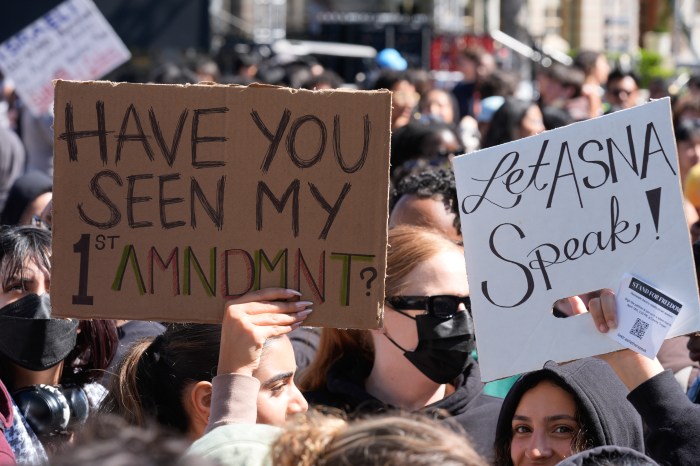EDINBURGH, Scotland – A terminally ill Libyan man convicted in the 1988 Lockerbie airline bombing moved closer to being allowed to die outside of his Scottish prison cell when a court agreed Tuesday he could drop an appeal against his conviction.
The ruling by three Scottish judges removed one legal hurdle that prevented Abdel Baset al-Megrahi from being transferred to a prison in his homeland.
A larger obstacle to his release may be the opposition of the U.S. government and the relatives of many victims, who say al-Megrahi should stay behind bars for the attack that killed 270 people.
“We maintain our long-standing position that Megrahi should serve out the entirety of his sentence in Scotland for his part in the bombing of Pan Am flight 103,” U.S. National Security Council spokesman Michael Hammer said Tuesday.
Scottish Justice Minister Kenny MacAskill is now deciding whether to approve the transfer to a Libyan prison, keep al-Megrahi in jail in Scotland or release him on compassionate grounds. The bomber has advanced prostate cancer and has been given just months to live.
MacAskill has said he will decide al-Megrahi’s fate within two weeks.
Scottish First Minister Alex Salmond said MacAskill “will take a decision shortly in the interests of justice.”
“There will be no consideration of international power politics or anything else,” Salmond said.
U.S. Secretary of State Hillary Clinton has urged Scotland to keep al-Megrahi in prison to serve out his 27-year sentence. Seven U.S. senators – including Edward Kennedy and John Kerry – also wrote to MacAskill with a similar request, calling the bombing a “heinous crime.”
They said the international agreement that brought the Libyan to justice “called for his sentence to be served in Scotland and we believe strongly there should be no deviation from this sentence.”
Al-Megrahi, 57, was convicted in 2001 of taking part in the bombing of Pan Am Flight 103 on Dec. 21, 1988. The airliner – which was carrying mostly American passengers to New York – blew up as it flew over Scotland. All 259 people aboard and 11 on the ground died when the aircraft crashed into the town of Lockerbie.
A judicial review of al-Megrahi’s case two years ago raised serious questions about the evidence used to convict him, spurring his appeal. Yet people with pending legal proceedings cannot be transferred to another country – a fact that prompted al-Megrahi’s request for permission to abandon his appeal.
The Scottish court still has to hear a separate appeal by the government, which feels the bomber’s 27-year minimum sentence is too short. The lead judge, Arthur Hamilton, urged prosecutors to decide “without undue delay” whether to continue with their appeal.
If they do, a hearing is scheduled for Sept. 8.
The prospect of al-Megrahi’s release has sharply divided the families of the victims.
Some American families argue that Libyan leader Moammar Gadhafi would feel vindicated if the convicted bomber was allowed to return.
“He should remain in prison,” said Susan Cohen of Cape May Courthouse, New Jersey, whose 20-year-old daughter Theodora died in the attack.
“If al-Megrahi is released, there will be no tangible evidence left that this ever happened,” she said. “It’s kind of a way of obliterating it.”
Joanne Hartunian of Delmar, New York, said she would “have a hard time dealing with” al-Megrahi’s release. Her daughter Lynne, a student at the State University of New York at Oswego, died aboard Flight 103.
“He wants to die with his family. My daughter didn’t get to die with her family,” Hartunian said.
But the relatives of some British victims want him to be released on compassionate grounds and his appeal continued as a way of uncovering more information about the bombing. The appeal could continue even if al-Megrahi died.
“By abandoning his appeal, we the families will be robbed of the opportunity to find justice,” said the Rev. John Mosey, whose daughter Helga died aboard Flight 103.
Mosey said he was “85 per cent sure” that al-Megrahi was not guilty. The Libyan’s lawyers have argued the attack was the result of an Iranian-financed Palestinian plot.
Margaret Scott, Al-Megrahi’s lawyer, told a court in Edinburgh on Tuesday that her client has terminal prostate cancer and had been given only months to live.
She said he was in pain and serious health complications were “certain to arrive” very shortly.
The Scottish Prison Service would not comment directly on the case, but said its prisons do not have the facilities to treat inmates who need hospitalization.
Spokesman Tom Fox refused to confirm that al-Megrahi remained in Greenock Prison near Glasgow, where he has been serving his sentence, or whether al-Megrahi would be fit to fly if released.
Release on compassionate grounds occurs occasionally in Britain. Forty-eight prisoners have been granted compassionate release in the last five years in England and Wales, according to government figures. The total does not include Scotland, which has a separate judicial system.
–
Associated Press Writers Shawn Marsh in Trenton, New Jersey and Jessica M. Pasko in Albany, New York contributed to this report.


















